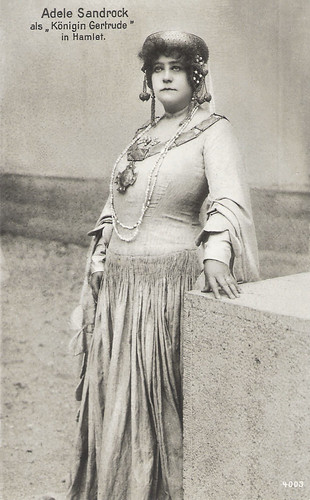
German Postcard by Verl. Hermann Leiser, Berlin, no. 4003. Photo: Photo-Arbeit, München (Munich). Adele Sandrock as Queen Gertrude in a stage production of 'Hamlet'.
Grand German-Dutch actress Adele Sandrock (1863-1937) had a successful theatrical career all over Europe. In Vienna, she had a stormy affair with the famous playwright Arthur Schnitzler and enjoyed triumphs as the diva of the modern playwrights. In the 1910s she became one of the first German film stars. After the introduction of sound, she emerged as a witty comedienne. She excelled as the intimidating elderly dragon, who could also be surprisingly funny and tactful.

German postcard by Verlag Hermann Leiser, Berlin-Wilm., no. 4110. Photo: Becker & Maass. Carl Clewing in the stage play 'Hohe Politik' (High Politics) by Julius Rosen.
German actor Carl Clewing (1884-1954) was an opera singer, the composer of the song 'Alle Tage ist kein Sonntag' (Not every day is a Sunday) and a Music professor in Berlin During the years of the early cinema he was much in demand as a film actor.
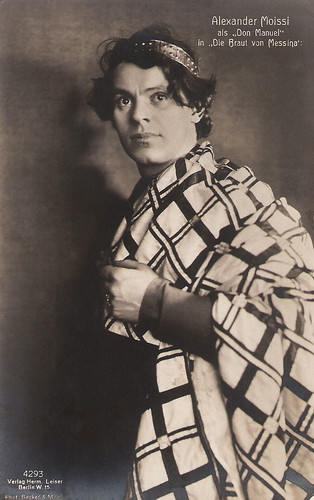
German postcard by Verlag Hermann Leiser, Berlin-W, no. 4293. Photo: Becker & Maass. Alexander Moissi as Don Manuel in a stage production of 'Die Braut von Messina' (The Bride of Messina) by Friedrich Schiller.
Albanian-Austrian Alexander Moissi (1879-1935), born as Aleksandër Moisiu, was one of the great European stage actors of the early 20th century. The attractive and charismatic women's idol also appeared in several silent and early sound films.
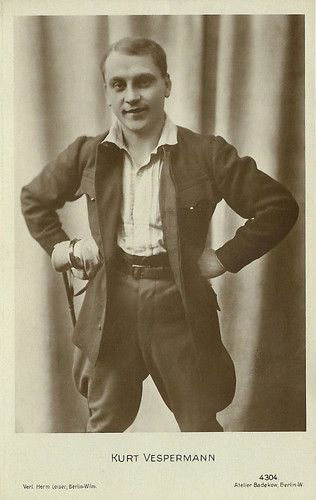
German postcard by Verlag Hermann Leiser, Berlin-Wilm., no. 4304. Photo: Atelier Badekow, Berlin-W. Collection: Didier Hanson.
German character actor Kurt Vespermann (1887-1957) was active in nearly 200 films between 1915 and 1957.
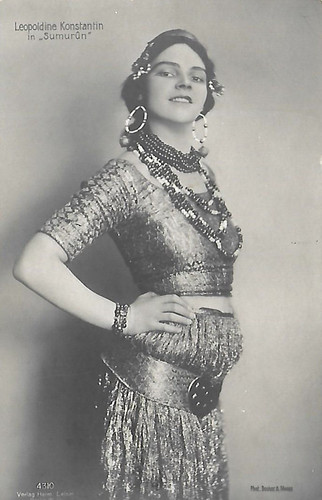
German postcard by Verlag Hermann Leiser, no. 4310. Photo: Becker & Maass. Leopoldine Konstantin in Sumurûn (Max Reinhardt, 1910). Collection: Didier Hanson.
Leopoldine Konstantin (1886-1965) was a famous Austrian theatre and film character actress, who worked for years with director Max Reinhardt. She played Claude Rains' dominant mother in Alfred Hitchcock’s classic Notorious (1946). It was her sole Hollywood role.
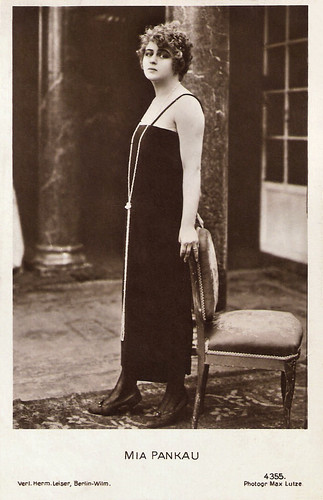
German postcard by Verlag Hermann Leiser, Berlin-Wilm., no. 4355. Photo: Max Lutze.
Mia Pankau (1891-1974) was a German actress of the silent cinema. Most of her films were directed by her husband, Jaap Speyer.
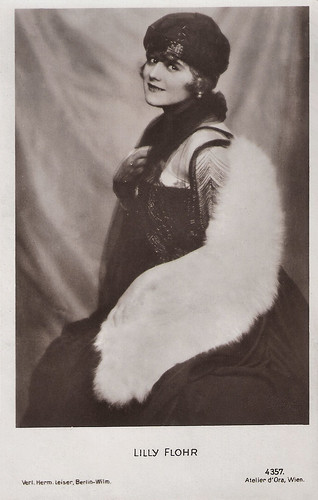
German postcard by Verlag Hermann Leiser, Berlin-Wilm., no. 4357. Photo: Atelier d'Ora, Wien.
Austrian film star Lilly Flohr (1893-1978) was a busy actress, soubrette, cabaret artist and chanson singer on stage. From 1918 on she starred in 25 silent films.

German postcard by Verlag Hermann Leiser, Berlin, no. 4552. Photo: Becker & Maass. Caption: Paul Wegener as King Oedipus in 'Oedipus Rex' (1910), directed by Max Reinhardt.
'Oedipus Rex', Sophocles's classic tragedy, directed by Max Reinhardt in a translation by Hugo von Hofmannsthal, was first performed in 1910 at a Summer festival in Munich and in the Fall in a circus arena in Berlin. Stars were Paul Wegener as Oedipus and Tilla Durieux as Jocasta, though some considered the masses of extras performing the Thebans to be the real stars. Emily Bilski writes in 'Berlin Metropolis: Jews and the New Culture, 1890-1918': "Oedipus was the first major theatre-in-the-round production in modern times that featured masses of actors performing for a mass audience."

German postcard by Verlag Hermann Leiser, Berlin-W., no. 4553 a. Photo: Zander & Labisch, Berlin. Paul Wegener in 'König Oedipus' (1910). Caption: King Oedipus.
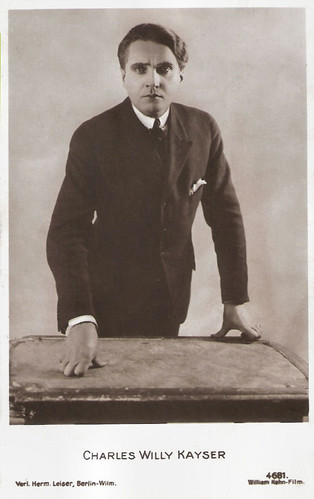
German postcard by Verlag Hermann Leiser, Berlin-Wilm., no. 4681. Photo: William Kahn-Film. Charles Willy Kayser in Dämon der Welt. 1. Das Schicksal des Edgar Morton/Demon of the world, part 1: The Fate of Edgar Morton (Rudolf Del Zopp, Siegfried Dessauer, 1919).
German actor Charles Willy Kayser (1881-1942) had a remarkable career in the silent cinema. However, today he is little known, while many of his films are considered lost now and there is little information about his work.

German postcard by Verlag Hermann Leiser, Berlin, no. 4794. Photo: Atelier Wasow, München.
Walter Janssen (1887-1976), originally Walter Philipp Janßen, was a German stage and screen actor and film director. Between the late 1910s and the late 1950s, Walter Janssen had a very prolific acting career in German cinema.
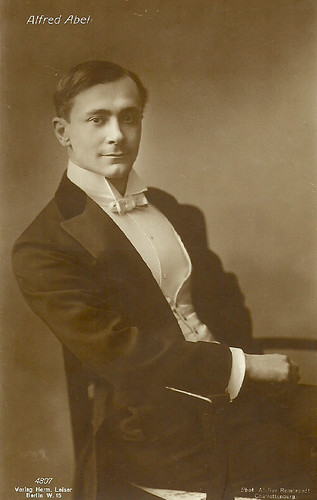
German postcard by Verlag Hermann Leiser, no. 4807. Photo: Atelier Rembrandt, Charlottenburg. Collection: Didier Hanson.
Alfred Abel (1879-1937), best known as the industrial Fredersen in Fritz Lang's Metropolis, played in over 140 silent and sound films between 1913 and 1938.
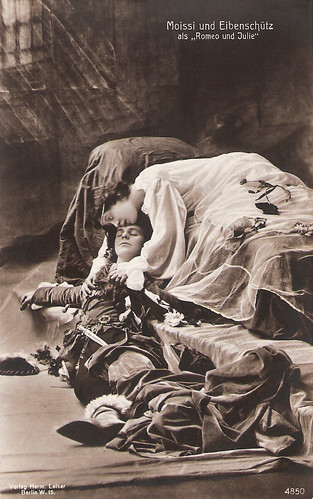
German postcard by Verlag Hermann Leiser, Berlin-W., no. 4850. Photo: Alexander Moissi and Camilla Eibenschütz in a 1907 production of the stage play 'Romeo und Julie' (Romeo and Juliet) by William Shakespeare.
Albanian-Austrian Alexander Moissi (1879-1935) was one of the great European stage actors of the early 20th century. The attractive and charismatic women's idol also appeared in several silent and early sound films.

German postcard by Verlag Hermann Leiser, Berlin-Wilmersdorf, no. 5000. Olaf Fønss in the Danish film Laegen/Pesten (Fritz Rasmussen, 1917). The German title was Die Seuche (The Plague). The film was written and directed by Fritz Rasmussen for Dansk Film Co. and released in Denmark in 1918.
Olaf Fønss (1882-1949) was one of Denmark and Germany's biggest stars of the silent film era. He also worked as a film director, producer and censor.
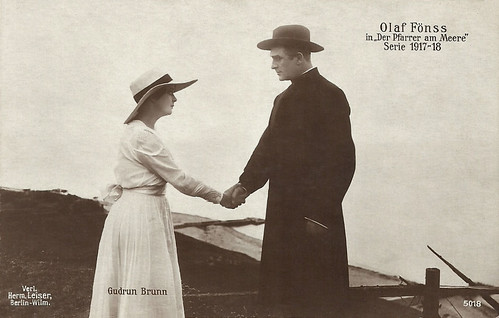
German postcard by Verlag Hermann Leiser, Berlin, no. 5018. Olaf Fønss and Gudrun Brunn in the Danish film Praesten fra havet (Fritz Magnussen 1918), released in Germany as Der Pfarrer am Meer (The Priest at the Sea).
Olaf Fønss (1882-1949) was one of Denmark and Germany's biggest stars of the silent film era. He also worked as a film director, producer and censor.

German postcard by Verlag Hermann Leiser, Berlin, no. 5074. Photo: Atelier B.J.G. Aud or Gerd Egede-Nissen and Georg Alexander.
Aud Egede Nissen and Georg Alexander played in many films together in the 1910s and were married from 1915 to 1924. Norwegian film actress Aud Egede-Nissen (1893-1974) was a star of the German silent cinema. In the 1910s, she produced dozens of her own films. In the 1930s she returned to Norway, where she appeared in some films and acted mainly on stage.
Georg Alexander (1888-1945) was a German actor, director and producer. He belongs to the busiest actors and his career continued smoothly till his death.
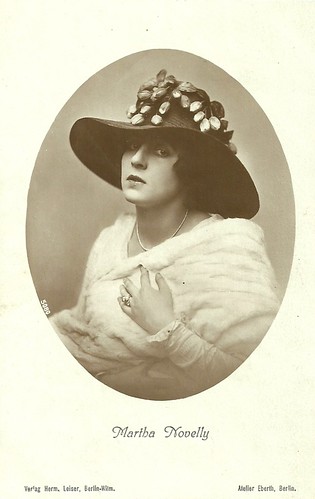
German postcard by Verlag Hermann Leiser, Berlin-Wilm., no. 5080. Photo: Atelier Eberth, Berlin.
Martha Novelly (1889-1972) was a German stage and screen actress who peaked in German silent films of the late 1910s.
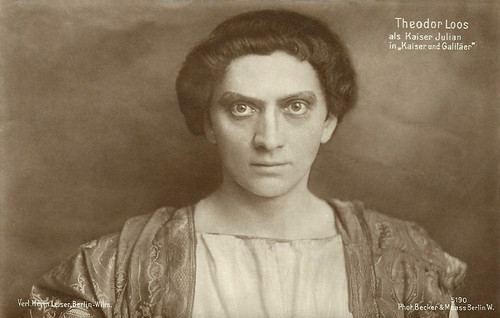
German postcard by Verlag Hermann Leiser, Berlin-Wilm., no. 5190. Photo: Becker & Maass, Berlin. Theodor Loos as Emperor Julian in the play 'Kaiser und Galiläer' (Emperor and Galilean) by Henrik Ibsen.
Theodor Loos (1883-1954) was a German stage and screen actor between the 1910s and the 1950s. He became famous for his parts in Fritz Lang’s German films.
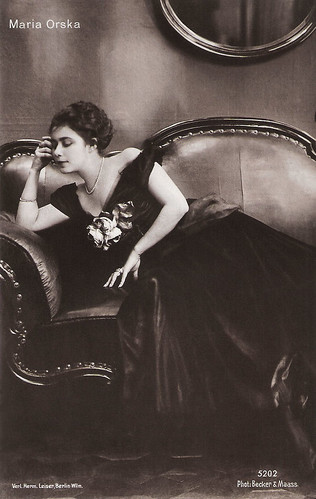
German postcard by Verlag Hermann Leiser, Berlin-Wilm., no. 5202. Photo: Becker & Maass.
Maria Orska (1893-1930) was a Russian-Jewish actress on the German stage and screen in the 1910s and 1920s.

German postcard by Verlag Hermann Leiser, Berlin-Wilm., no. 5233. Photo: R. Dührkoop.
Paul Heidemann (1884-1968) was a German stage and screen actor, and also a film director and producer. In the silent period, he was famous for his comical parts.
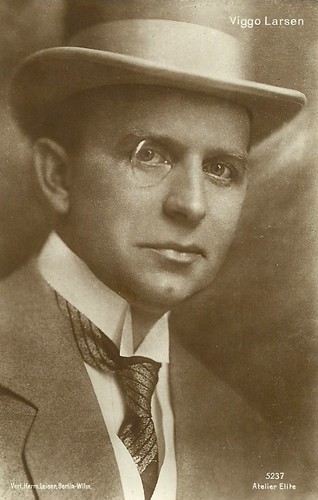
German postcard by Verlag Hermann Leiser, Berlin-Wilm., no. 5237. Photo: Atelier Elite.
Viggo Larsen (1880-1957) was a Danish actor, director, scriptwriter and producer. He was one of the pioneers in film history. With Wanda Treumann he directed and produced many German films of the 1910s.
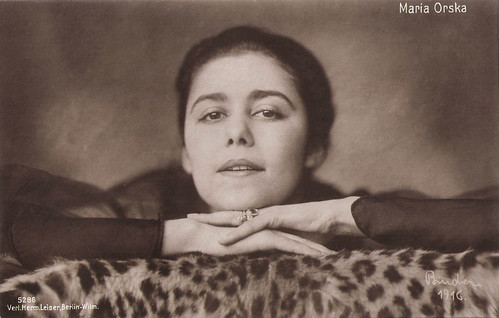
German postcard by Verlag Hermann Leiser, Berlin-Wilm., no. 5286. Photo: Alex Binder, 1916.
Maria Orska (1893-1930) was a Russian-Jewish actress on the German stage and screen in the 1910s and 1920s.
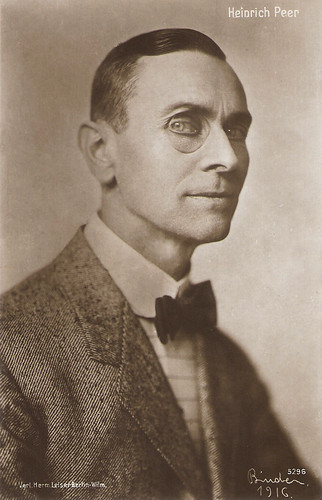
German postcard by Verlag Hermann Leiser, Berlin. no. 5296. Photo: Alex Binder, Berlin, 1916.
Austrian stage and film actor Heinrich Peer (1867–1927) belonged to the pioneers of German cinema and appeared in more than a hundred films between 1911 and 1927. The tall, thin actor with the distinctive, almost sinister face often played supporting parts in adventure and detective films but also played in melodramas and historical films.
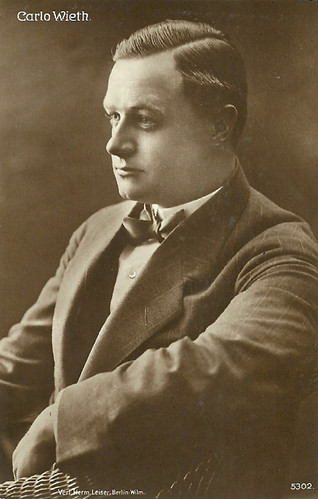
German postcard by Verlag Hermann Leiser, Berlin-Wilm., no. 5302.
Carlo Wieth (1885-1943) was a Danish actor, who starred in Danish and Swedish silent cinema of the 1910s and early 1920s, often paired with his then-wife Clara (Pontoppidan) Wieth.
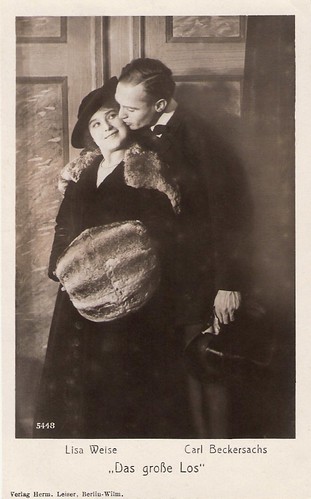
German postcard by Verlag Hermann Leiser, Berlin-Wilm., no. 5448. Photo: Lisa Weise and Karl Beckersachs in Das grosse Los/The Big Prize (Friedrich Zelnik, 1917).
German actress Lisa Weise (?-1952) starred in silent films of the 1910s. Most of her films were directed by Friedrich Zelnik and often her film partner was Karl Beckersachs.
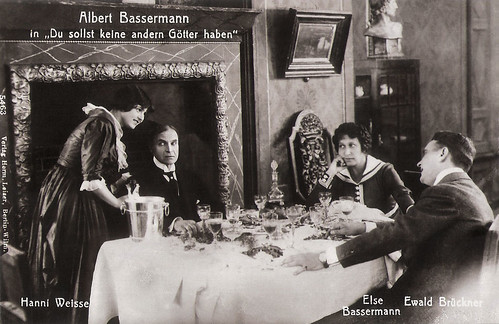
German postcard by Verlag Hermann Leiser, Berlin-Wilm., no. 5463. Photo: Albert Bassermann, Hanni Weisse, Else Bassermann and Ewald Brückner in Du sollst keine anderen Götter haben/Thou shalt have no other gods (Adolf Gärtner, 1917).
Albert Bassermann (1867–1952) was one of the first great German stage actors who worked for the cinema. In 1933 he fled the Nazi regime and became an Oscar-nominated stage and film actor in the US.
German actress Hanni Weisse (1892-1967) belonged to the great film divas of the early German silent film. She was able to maintain her stardom till the 1920s.
Else Bassermann, née Elisabeth Sara Schiff (1878-1961) was a German stage and screen actress, who in 1908 married renowned stage actor Albert Bassermann and often performed together with him on stage. When he started to play in the film, she accompanied him.
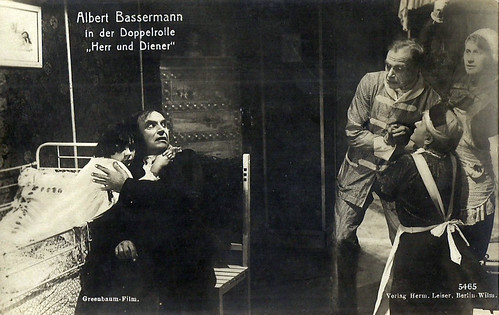
German postcard by Verlag Hermann Leiser, Berlin, no. 5465. Photo: Greenbaum-Film. Albert Bassermann in a dual role in the German silent film Herr und Diener/Master and Servant (Adolf Gärtner, 1917).
A reputed professor (Albert Bassermann) hires a servant (Bassermann) for a world trip. The servant is his spitting image. When the professor is lamed, the servant trades places with him. Nobody discovers the fraud, till one day the professor's maid (Else Bassermann) unmasks the culprit. The script was written by Else Basssermann under the pseudonym of Hans Hennings. On this postcard, Else Bassermann can be seen on the extreme right.
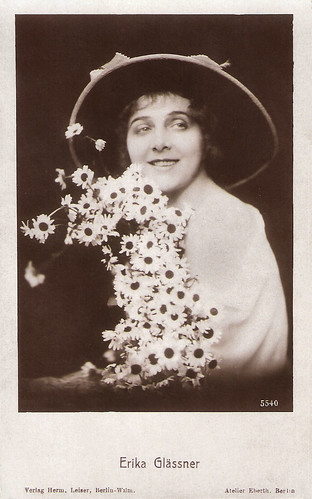
German postcard by Hermann Leiser, Berlin-Wilm, no. 5540. Photo: Atelier Eberth, Berlin.
Cute actress Erika Glässner (1890-1959) starred as a backfisch and later as a cheeky temptress in many German films of the silent era. From 1915 till 1952 she appeared in some 80 films.
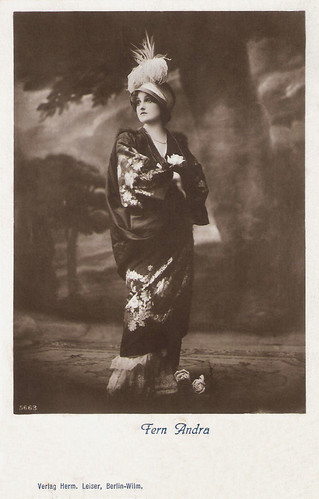
German postcard by Verlag Hermann Leiser, Berlin, no. 5663.
'Modern' American actress Fern Andra (1893-1974) became one of the most popular film stars of the German cinema in the 1910s and early 1920s. In her films, she mastered tight roping, riding a horse without a saddle, driving cars and motorcycles, bobsleighing, and even boxing.
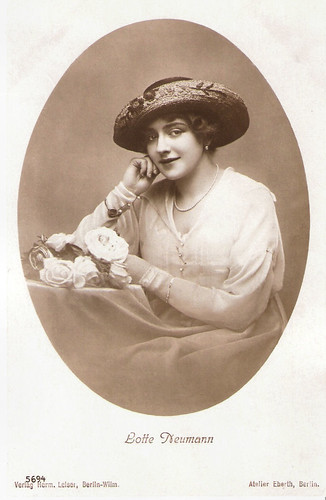
German postcard by Verlag Hermann Leiser, Berlin-Wilm., no. 5694. Photo: Atelier Eberth, Berlin.
Lotte Neumann (1896-1977) was one of the most successful actresses in the early days of the German silent cinema. She also worked as a screenwriter and producer.
To be continued tomorrow!
Source: Jean Ritsema (Ross Postcards).
No comments:
Post a Comment